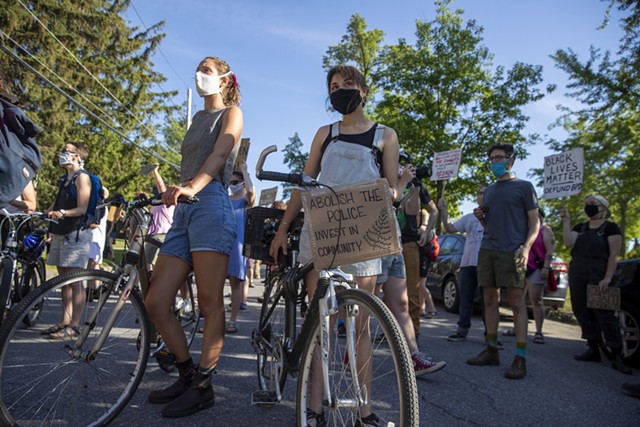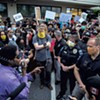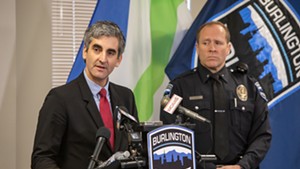Burlington City Council Votes to Cut Police Force Through Attrition

- File: James Buck
- Protesters at Mayor Miro Weinberger's house earlier this month
The resolution, which also includes a wide range of police reforms, was sponsored by nine councilors, all of whom voted to approve it; only councilors Ali Dieng (I-Ward 7), Chip Mason (D-Ward 5) and Joan Shannon (D-South District) voted no.
It's unclear what impact, if any, the resolution will have on the budget for the next fiscal year, which begins Wednesday. During a Board of Finance meeting on Monday, Mayor Miro Weinberger said the city doesn't know when officers will leave or retire, which makes it difficult to calculate how much the police budget would be reduced in the next year.
"It is possible there will be savings beyond the cuts already assumed in the budget, but I don't believe those cuts are bankable as of tonight," he said.
The department is budgeted to staff up to 105 sworn officers, but Burlington currently has 90 active cops on the force. In search of ways to trim police spending, Weinberger has proposed leaving 12 officer positions vacant while otherwise keeping the department's staffing levels intact.
Given that the discussion surrounding the resolution went until 1:45 a.m., councilors agreed to postpone a vote on the mayor's budget until Tuesday at 5:30 p.m.
Given that the discussion surrounding the resolution went until 1:45 a.m., councilors agreed to postpone a vote on the mayor's budget until Tuesday at 5:30 p.m.
The vote is the culmination of weeks of activism calling for police reform. Hundreds of people had called in to recent public meetings to demand that the city cut police spending in favor of social services. The Burlington protests and speak-outs were sparked by the death of George Floyd — a Black man who was killed by Minneapolis police in May — and by Queen City cops' own violent interactions with young Black men.
Related Cut the Police: The Bid to Slash Law Enforcement Funding in Vermont

Cut the Police: The Bid to Slash Law Enforcement Funding in Vermont
By Dan Bolles, Derek Brouwer, Colin Flanders and Courtney Lamdin
Crime
"The past few weeks have reminded, or in some cases taught us, to reexamine our own biases and privilege and be as brave as this moment calls for," Hightower said. "The resolution has flaws — one of them being that we are still overfocused on police reform rather than holistically addressing systemic racism ... but I think we have a solid plan for moving forward."
The resolution:
- directs the city to terminate the school resource officer program by spring 2021;
- declares racism a city health crisis;
- forms a joint committee of the council's Public Safety Committee and the Police Commission to assess police department operations and evaluate alternatives for public safety;
- requires city staff to receive training on systemic racism twice a year, or three times "for members of our criminal justice system";
- establishes a task force to consider an apology or reparations for the city's role in chattel slavery;
- allows the Police Commission to view all formal complaints about police officers;
- asks the council's Charter Change Committee to consider giving the Police Commission authority to approve or alter the police chief's disciplinary decisions in use-of-force cases; and
- urges the city to negotiate for additional accountability measures in the next police contract.
Councilor Dieng moved to strike the section of Hightower's resolution that called for reducing the force to 74 officers. Instead, he proposed creating a nine-person task force to study how to gradually reduce the police force before 2022, when the new police contract would be reviewed.
Under Dieng's plan, the committee would have been led by a consultant and would have explored alternative ways to respond to calls that don't involve crimes, culminating in a report due in May 2021.
Councilor Franklin Paulino (D-North District) said the city already created a special committee to review policing practices and thought Dieng's approach was repetitive. Councilor Chip Mason (D-Ward 5) said that committee didn't address the appropriate level of police staffing, whereas Dieng's proposed task force would have.
"We have had no conversations about who's going to provide those services if we reduce the force to 74," Mason said. "This resolution tries to push forward on an expedited basis a process that will allow public input and also effectuate the change that we want."
Councilor Jack Hanson (P-East District) said Dieng's amendment would have delayed the reforms demanded by hundreds of community members. The motion failed 9-3, with only Dieng, Mason and Shannon voting in favor.
Mason also attempted to change a section of the resolution pertaining to school resource officers. He suggested that instead of terminating the program, the city form a task force to examine officers' role in schools.
Councilor Perri Freeman (P-Central District) slammed the proposal, calling it an "extremely bureaucratic process" that isn't needed to "dismantle white supremacy." Mason's amendment failed 9-3, with the same councilors voting in favor.
Councilor Jane Stromberg (P-Ward 8) attempted to make even deeper cuts to the police department. Her amendment would have reduced the current force of 90 by more than 30 percent, to 63 officers by fiscal year 2023.
"The resounding message was, 'Do not pass this budget until these demands are met,'" Stromberg said, referencing the calls made by the Racial Justice Alliance and its allies. "We understand what that means, right? We're already compromising."
Councilor Sarah Carpenter (D-Ward 4) said that "attrition would be the kindest way to get us to where we want to go." Hanson, however, supported Stromberg's amendment, saying the council doesn't know how long attrition will take. "We're trying to reallocate and reinvest, and this does so in a more concrete way," he said.
Stromberg's amendment failed 9-3, with councilors Hanson and Freeman joining her with yes votes.
Weinberger spoke against Stromberg's resolution, saying the additional cuts would be dangerous without a robust community conversation and study about the right level of reductions.
"While I certainly respect the proposals that are on the table, I don't think we have thought through all the implications of them," he said.
Police department brass have agreed with Weinberger's analysis. Prior to the meeting that began on Monday evening, acting Chief Jon Murad issued a memo that said reducing the force to 74 officers would trigger an "emergency staffing" clause in the police contract that effectively eliminates special police assignments such as its domestic violence prevention officer. The cut would result in 22 percent fewer officers on patrol, Murad wrote.
"The BPD cannot provide the same patrol services" at that level, he wrote. "Twenty-two percent of our current call volume is approximately 6,270 calls. For which of these 6,270 calls do our neighbors not want or need police response?"
Earlier in the meeting, the council unanimously appointed two new Burlingtonians to the police commission: Melo Grant and Kerin Durfee. The new appointees replace incumbent Nyree Miles, who reapplied but was not reappointed, and former commission chair Michele Asch, who will step down when her term ends on Tuesday.
Grant, a Ward 3 resident, also served on the council's special Committee to Review Policing Practices, which recommended updates to the department's use-of-force policy that were recently implemented.
Related Burlington Police Commission Approves New Use-of-Force Policy

Burlington Police Commission Approves New Use-of-Force Policy
By Courtney Lamdin
Off Message
Durfee, a Ward 7 resident, identifies as a "person of color with centrist views," according to her application. As commissioner, she hopes to "reduce the fear of the police" while ensuring accountability for use-of-force incidents, she wrote.
"My overall goal would be to reduce tensions in our community and help facilitate a better understanding of policing," Durfee wrote.
Besides Miles, two other people — Chris Cadieux and Jessica Ruth Savage —
applied for positions on the commission but neither received nominations. Skyler Nash, who served on the special policing committee, had applied but withdrew his application before the council meeting.
Correction, June 30, 2020: An earlier version of this story misstated the number of police commission applicants the city council was considering.
Related Stories
-

Burlington Council President Karen Paul Is Running for Mayor
By Courtney Lamdin October 24, 2023
-

Burlington and Its Police Union Are Close to Signing a New Three-Year Labor Contract
By Courtney Lamdin July 20, 2022
-

Murad’s Indefinite Role as Burlington’s Acting Police Chief Raises Questions About Mayoral Authority
By Courtney Lamdin March 16, 2022
-

Weinberger to Name Jon Murad as Burlington's Next Police Chief
By Courtney Lamdin January 27, 2022
-

Burlington Dems Endorse Five Candidates for City Council Elections
By Courtney Lamdin December 19, 2021
Speaking of...
-

Burlington Will Vote on Police Oversight Measure in November
Jul 16, 2024 -

Burlington Council Unanimously Passes a $107.8 Million Budget
Jun 24, 2024 -

Emails Show Burlington Educators Were Surprised, Too, by Mock Shooting That Terrified Students
Jun 12, 2024 -

Burlington Officials Outline Plan for Water, Portable Toilets at Encampments
Jun 11, 2024 -

Burlington Police Terrified High School Students With Mock Shooting
Jun 6, 2024 - More »





Comments
Comments are closed.
From 2014-2020, Seven Days allowed readers to comment on all stories posted on our website. While we've appreciated the suggestions and insights, right now Seven Days is prioritizing our core mission — producing high-quality, responsible local journalism — over moderating online debates between readers.
To criticize, correct or praise our reporting, please send us a letter to the editor or send us a tip. We’ll check it out and report the results.
Online comments may return when we have better tech tools for managing them. Thanks for reading.